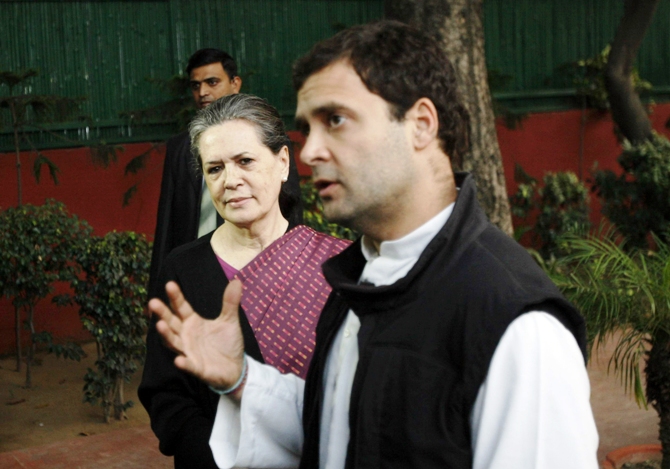Photographs: Reuters
Global rating agency Fitch on Tuesday expressed fear that the defeat of Congress in four of the five state assembly elections could lead to higher fiscal deficit target as the government would be constrained to curb expenditure.
"The setback faced by the Congress Party in state elections could potentially raise political pressure on the government's near-term fiscal goals," it said.
The government has articulated a strong commitment to fiscal consolidation, it said adding, "but this commitment may be tested further as the deficit-reduction goals are stretched, and a steeper political struggle to pull in more votes may hinder the full scope of expenditure restraint."
. . .
Defeat of Congress may lead to higher fiscal deficit: Fitch
Image: A worker sits on top of a handcart loaded with goods at a wholesale grocery market in the old quarters of Delhi.Photographs: Mansi Thapliyal/Reuters
An evident anti-incumbency trend against the Congress could mean an increasing likelihood of political pressure to limit expenditure cut-backs, it said.
For the current fiscal, the government has set fiscal deficit target of 4.8 per cent of the gross domestic product.
The government's fiscal deficit has already reached 84 per cent of its stated target in the first seven months of the fiscal year, versus 72 per cent over the same period a year ago.
This implies a weaker headline -- and operating -- fiscal position, it said, adding, unless revenues surprise significantly on the upside in the remaining months of the fiscal year, it also implies the need for greater expenditure restraint than last year, to meet the deficit target.
. . .
Defeat of Congress may lead to higher fiscal deficit: Fitch
Image: Finance Minister Palaniappan Chidambaram speaks at the Indian Private Equity and Venture Capital Association conclave in New Delhi July 16, 2013.Photographs: Mansi Thapliyal/Reuters
"We will assess the campaign pledges, and the implications for the post-election fiscal outlook.
“A more definitive medium-term fiscal framework will only emerge once the next government is formed," it said.
The rating agency also said that the state of public finances form an important driver of India's sovereign ratings.
Amid the monetary authorities' anti-inflation policy bias, appropriate fiscal policies have a greater chance of shoring up the country's savings-investment imbalance.
This could lower the current account deficit, and help alleviate another key pressure point for the credit profile, it added.




article